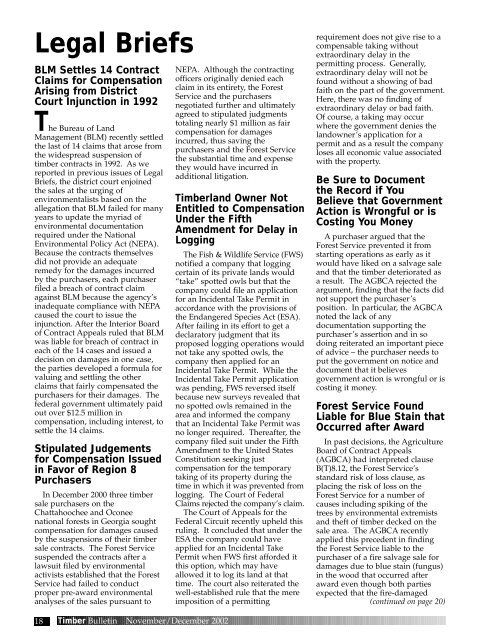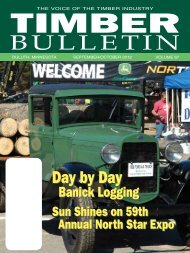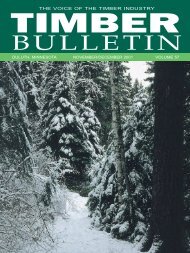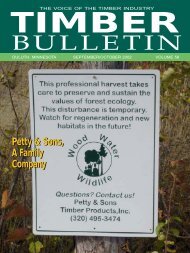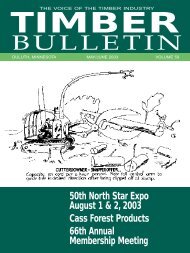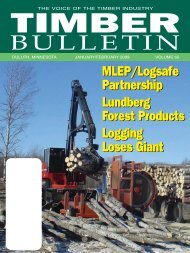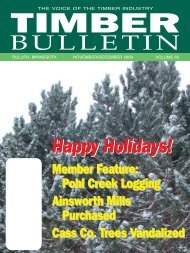Timber Bulletin Nov/Dec - Minnesota Forest Industries
Timber Bulletin Nov/Dec - Minnesota Forest Industries
Timber Bulletin Nov/Dec - Minnesota Forest Industries
You also want an ePaper? Increase the reach of your titles
YUMPU automatically turns print PDFs into web optimized ePapers that Google loves.
Legal Briefs<br />
BLM Settles 14 Contract<br />
Claims for Compensation<br />
Arising from District<br />
Court Injunction in 1992<br />
The Bureau of Land<br />
Management (BLM) recently settled<br />
the last of 14 claims that arose from<br />
the widespread suspension of<br />
timber contracts in 1992. As we<br />
reported in previous issues of Legal<br />
Briefs, the district court enjoined<br />
the sales at the urging of<br />
environmentalists based on the<br />
allegation that BLM failed for many<br />
years to update the myriad of<br />
environmental documentation<br />
required under the National<br />
Environmental Policy Act (NEPA).<br />
Because the contracts themselves<br />
did not provide an adequate<br />
remedy for the damages incurred<br />
by the purchasers, each purchaser<br />
filed a breach of contract claim<br />
against BLM because the agency’s<br />
inadequate compliance with NEPA<br />
caused the court to issue the<br />
injunction. After the Interior Board<br />
of Contract Appeals ruled that BLM<br />
was liable for breach of contract in<br />
each of the 14 cases and issued a<br />
decision on damages in one case,<br />
the parties developed a formula for<br />
valuing and settling the other<br />
claims that fairly compensated the<br />
purchasers for their damages. The<br />
federal government ultimately paid<br />
out over $12.5 million in<br />
compensation, including interest, to<br />
settle the 14 claims.<br />
Stipulated Judgements<br />
for Compensation Issued<br />
in Favor of Region 8<br />
Purchasers<br />
In <strong>Dec</strong>ember 2000 three timber<br />
sale purchasers on the<br />
Chattahoochee and Oconee<br />
national forests in Georgia sought<br />
compensation for damages caused<br />
by the suspensions of their timber<br />
sale contracts. The <strong>Forest</strong> Service<br />
suspended the contracts after a<br />
lawsuit filed by environmental<br />
activists established that the <strong>Forest</strong><br />
Service had failed to conduct<br />
proper pre-award environmental<br />
analyses of the sales pursuant to<br />
NEPA. Although the contracting<br />
officers originally denied each<br />
claim in its entirety, the <strong>Forest</strong><br />
Service and the purchasers<br />
negotiated further and ultimately<br />
agreed to stipulated judgments<br />
totaling nearly $1 million as fair<br />
compensation for damages<br />
incurred, thus saving the<br />
purchasers and the <strong>Forest</strong> Service<br />
the substantial time and expense<br />
they would have incurred in<br />
additional litigation.<br />
<strong>Timber</strong>land Owner Not<br />
Entitled to Compensation<br />
Under the Fifth<br />
Amendment for Delay in<br />
Logging<br />
The Fish & Wildlife Service (FWS)<br />
notified a company that logging<br />
certain of its private lands would<br />
“take” spotted owls but that the<br />
company could file an application<br />
for an Incidental Take Permit in<br />
accordance with the provisions of<br />
the Endangered Species Act (ESA).<br />
After failing in its effort to get a<br />
declaratory judgment that its<br />
proposed logging operations would<br />
not take any spotted owls, the<br />
company then applied for an<br />
Incidental Take Permit. While the<br />
Incidental Take Permit application<br />
was pending, FWS reversed itself<br />
because new surveys revealed that<br />
no spotted owls remained in the<br />
area and informed the company<br />
that an Incidental Take Permit was<br />
no longer required. Thereafter, the<br />
company filed suit under the Fifth<br />
Amendment to the United States<br />
Constitution seeking just<br />
compensation for the temporary<br />
taking of its property during the<br />
time in which it was prevented from<br />
logging. The Court of Federal<br />
Claims rejected the company’s claim.<br />
The Court of Appeals for the<br />
Federal Circuit recently upheld this<br />
ruling. It concluded that under the<br />
ESA the company could have<br />
applied for an Incidental Take<br />
Permit when FWS first afforded it<br />
this option, which may have<br />
allowed it to log its land at that<br />
time. The court also reiterated the<br />
well-established rule that the mere<br />
imposition of a permitting<br />
requirement does not give rise to a<br />
compensable taking without<br />
extraordinary delay in the<br />
permitting process. Generally,<br />
extraordinary delay will not be<br />
found without a showing of bad<br />
faith on the part of the government.<br />
Here, there was no finding of<br />
extraordinary delay or bad faith.<br />
Of course, a taking may occur<br />
where the government denies the<br />
landowner’s application for a<br />
permit and as a result the company<br />
loses all economic value associated<br />
with the property.<br />
Be Sure to Document<br />
the Record if You<br />
Believe that Government<br />
Action is Wrongful or is<br />
Costing You Money<br />
A purchaser argued that the<br />
<strong>Forest</strong> Service prevented it from<br />
starting operations as early as it<br />
would have liked on a salvage sale<br />
and that the timber deteriorated as<br />
a result. The AGBCA rejected the<br />
argument, finding that the facts did<br />
not support the purchaser’s<br />
position. In particular, the AGBCA<br />
noted the lack of any<br />
documentation supporting the<br />
purchaser’s assertion and in so<br />
doing reiterated an important piece<br />
of advice – the purchaser needs to<br />
put the government on notice and<br />
document that it believes<br />
government action is wrongful or is<br />
costing it money.<br />
<strong>Forest</strong> Service Found<br />
Liable for Blue Stain that<br />
Occurred after Award<br />
In past decisions, the Agriculture<br />
Board of Contract Appeals<br />
(AGBCA) had interpreted clause<br />
B(T)8.12, the <strong>Forest</strong> Service’s<br />
standard risk of loss clause, as<br />
placing the risk of loss on the<br />
<strong>Forest</strong> Service for a number of<br />
causes including spiking of the<br />
trees by environmental extremists<br />
and theft of timber decked on the<br />
sale area. The AGBCA recently<br />
applied this precedent in finding<br />
the <strong>Forest</strong> Service liable to the<br />
purchaser of a fire salvage sale for<br />
damages due to blue stain (fungus)<br />
in the wood that occurred after<br />
award even though both parties<br />
expected that the fire-damaged<br />
(continued on page 20)<br />
18<br />
<strong>Timber</strong> <strong>Bulletin</strong> <strong>Nov</strong>ember/<strong>Dec</strong>ember 2002


